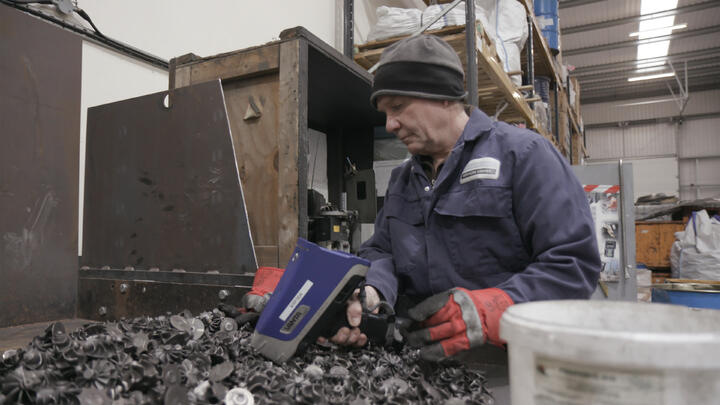AMRC at forefront of innovative recycling technology and circular economy development
02 March 2021Engineers at the University of Sheffield Advanced Manufacturing Research Centre (AMRC) used their simulation capabilities to support a metal processing business in developing an automated scrap sorting technology that can contribute to a circular economy and help preserve the planet.
Advanced Alloys, based in Dinnington, Sheffield, processes significant quantities of aerospace scrap, which is currently sorted manually. It is difficult to determine the grade and composition of the different materials, and currently rare elements found in aerospace alloys, which are hard to identify, are not sorted. This results in high-value elements being amalgamated in lower value materials, such as stainless variants.
Advanced Alloys worked with the AMRC, part of the High Value Manufacturing (HVM) Catapult network of research centres, to explore the improvement and automation of the process of identifying and sorting rare earth metals for reuse. The project was paid for using funds from HVM Catapult as part of a commitment to support smaller and medium-sized businesses.
A team of engineers from the AMRC's Factory 2050 facility worked with Advanced Alloys to suggest technologies that could be used within the automated process. These included the use of cameras, robotics, conveyors, inscribing technology and high-speed X-ray fluorescence. The AMRC also provided support with understanding the costs and benefits associated with each specific technology.
Stephen Hall, Managing Director of Advanced Alloys, said while events of 2020 have meant temporarily pushing the pause button on the project, the company hopes to restart in 2021.
“In a way, the pause might not have been a bad thing,” said Stephen. “The suggestions we had from the AMRC took us to the edge of what is currently possible, and further refinement of image analysis software, in particular, would help us get to where we want to be. Robotics is great at identifying pieces and components of a regular size and shape, but we're often looking at irregular shapes, sharp edges, and an array of different sizes.
The suggestions we had from the AMRC took us to the edge of what is currently possible.
“We're pushing at the limits of technology here. The strength of the AMRC is in adapting developments at the cutting edge of new technology into the workplace, and it is inspirational to see.”
Dr Phil Yates of the AMRC said the work undertaken for Advanced Alloys was ‘fascinating’ and the type of project ‘where you realise you're working on something important’.
Dr Yates added: “There is already a lot of automation across the industry in manufacturing and assembly. Where there's much less automation is in recycling. It's more challenging to find ways to automate the identification and sorting of scrap materials. So, this was a great project for the AMRC. We like doing the awkward stuff; the stuff that taxes our brains and uses our skills.
“We put together simulations of a number of methods for identifying and cleaning different scrap metals, some of which are very expensive and can also be dangerous, so these elements could be separated out from the rest of the scrap and recycled for use again.
"This is about supporting a fantastic local business, but ultimately, when it comes to keeping these rare earth elements in use, it's also about developing technology that can contribute to a circular economy, to design out waste and keep materials in use, and help preserve the planet."
Stephen added: "Working with the AMRC opened our eyes to what is possible. I'd say to any business considering working with the AMRC, this is a way you can access new technology, understand what's available and how it might apply practically to your work. We often expect innovative technology to be cost-prohibitive and out of our reach, but the AMRC bridges that divide between normal manufacturing businesses and advanced engineering developments."


